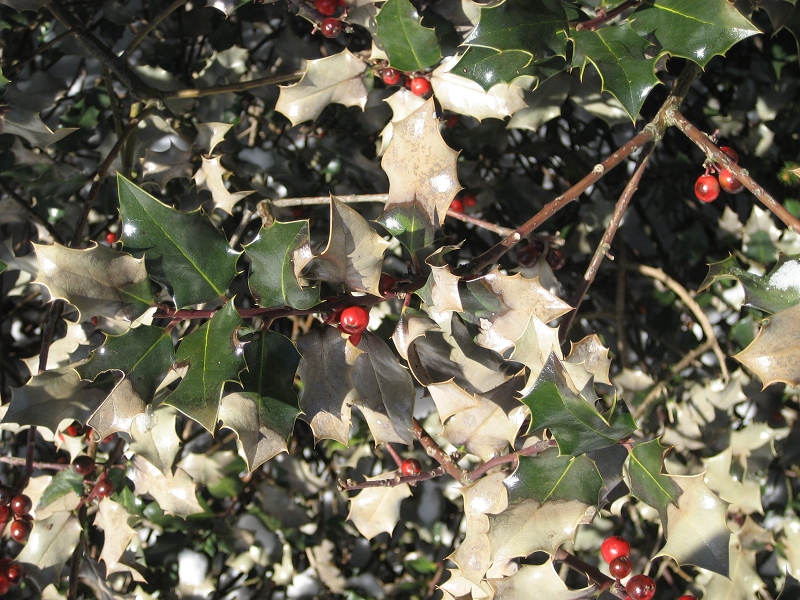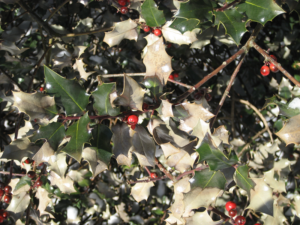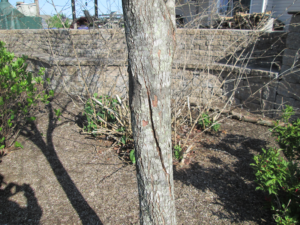Monthly Archives: January 2018
Winter Damage on your Landscape Plants

When we think of snow, we’re reminded of slippery roadways, shoveling, salting our driveways and walkways, sitting in front of a warm fireplace and often forget about the plants outside in the landscape. Not all plants will have winter damage. Sometimes the snow will act like an insulator and protect your plants against the cold temperatures and winds. However, there are many other factors that can cause winter damage to plants that you may not have thought about.
What kind of winter damage can occur?
 In general, the winter brings cold day time temperatures, less sunlight and moisture, potentially heavy winds and freezing nights. Some plants are hardy enough to survive the cold winter months. However, a plant weakened by summer stress may be more susceptible to winter and snow damage.
In general, the winter brings cold day time temperatures, less sunlight and moisture, potentially heavy winds and freezing nights. Some plants are hardy enough to survive the cold winter months. However, a plant weakened by summer stress may be more susceptible to winter and snow damage.
The first kind of winter damage to plants is called desiccation. Desiccation occurs when the ground is frozen and plants cannot take up water, causing the leaves to dry out. Water loss is greatest during windy, sunny and milder weather. The leaves of broadleaf evergreens will curl inward and hang down when there is not enough moisture in the leaves. You will notice the leaves start to burn around the edges and slowly work inward. After turning brown and drying up, the leaves may fall off the branches.
The next type of winter damage to plants is “bark splitting” or “frost cracking”. Heating and freezing on a daily basis, along with wind and bright sunny skies will cause the dehydrated bark to split open or crack. The water inside the tree will freeze and expand causing the splitting. This can cause injury or death to the tree. Most of the smaller ornamental plants will recover from this by growing the bark back together again, but bigger trees may not able to recover.
 One often overlooked form of winter damage to plants and trees is caused by salt. Wind-driven salt sprays from road trucks can travel up to 150 feet. The salt can cause extreme damage to pine, spruce and fir trees. Salt damage to evergreen plants causes the needles to brown from the tip to the base. Trees that lose their leaves each year may be damaged as well, but the damage will not be noticeable until the spring of the following year when the plants do not leaf out or bud properly because of bud damage. If rain or snow melt does not dilute salt placed on sidewalks or driveways, the soil becomes very salty and can easily damage plants. Follow this link to our salt damage blog for more information.
One often overlooked form of winter damage to plants and trees is caused by salt. Wind-driven salt sprays from road trucks can travel up to 150 feet. The salt can cause extreme damage to pine, spruce and fir trees. Salt damage to evergreen plants causes the needles to brown from the tip to the base. Trees that lose their leaves each year may be damaged as well, but the damage will not be noticeable until the spring of the following year when the plants do not leaf out or bud properly because of bud damage. If rain or snow melt does not dilute salt placed on sidewalks or driveways, the soil becomes very salty and can easily damage plants. Follow this link to our salt damage blog for more information.
Finally, there is ice and snow damage. This can happen when there is excessive snow on landscape plants. Snow can accumulate on plants naturally from a snowstorm, or it can be piled up on plants as we remove snow from our sidewalks and driveways. Oftentimes we don’t have anywhere to put the snow and we throw it onto our landscape plants without realizing it. This will put a significant amount of weight on the branches of your plants causing them to bend or break and impede the flow of nutrients and moisture in the vascular system of the plant. This type of snow damage is difficult to identify and will not likely show up for several months into the growing season.
What can I do to help reduce winter damage to plants?
- Pick trees and shrubs that are hardy and good for the specific area you live in.
- We recommend an anti-desiccant application for all broadleaf evergreens on your property to help stop desiccation. An anti-desiccant spray will coat the foliage of the evergreen plants with a thin layer of an organic “sealant” to help them resist the drying power of winter winds and conserve the moisture vital to their health.
- Wrap your landscape plants with burlap or create a “screen” or “windbreak” around the plants that are susceptible to winter damage. This will help reduce the constant cold wind directly hitting the landscape plants and protect them from snow, frost and ice.
- Protect the trunks of the smaller trees from “frost crack” or “bark splitting” with a commercial tree wrap such as a polyurethane spiral wrap or paper wrap. The wrap should be applied in the fall, and should be removed prior to the spring.
- Fertilize your plants. The lack of proper nutrition can make your landscape plants more susceptible to winter damage. You should have your plants fertilized regularly in the fall to provide the necessary nutrients the plants will need for the winter.
- Water your newly planted trees and shrubs until the ground freezes and apply 3-5 inches of mulch to help insulate the ground around the roots of the trees and shrubs.
- Wait until the plants are dormant before pruning. Pruning while the plant is actively growing can cause the tree to grow more and put out new growth. This new growth will not survive the cold winter and can lead to disease or rot causing decline and permanent damage.
- After a snowstorm we recommend you brush off the snow from the branches of your trees and shrubs to protect from snow damage. Lightly knock off the snow with a broom. This will reduce the weight on the individual branches which will help reduce bending or breaking. However, do not try and remove ice from your trees and shrubs after an ice storm. This will most likely cause more harm than good to your plants. Also, when shoveling or snow blowing the driveway and walkways, try not to throw the snow onto the landscape plants. Put the snow onto areas that can handle heavy, wet snow.
- Finally, try to minimize your salt usage on your sidewalks and driveways as much as possible. Runoff can cause the salt that has not dissolved to run into your landscape beds, roads and sewers.
Conclusion
There are many ways your trees and shrubs can be damaged during the winter season. The good news is there are options available to help minimize stress and winter damage to plants. If you are in our service area and have any questions about protecting your plants this winter, please feel free to call our office at 908-281-7888.




